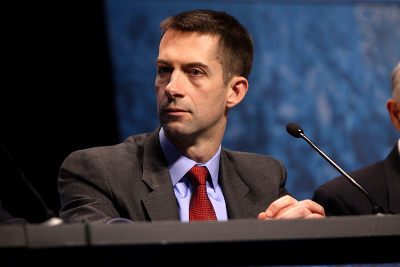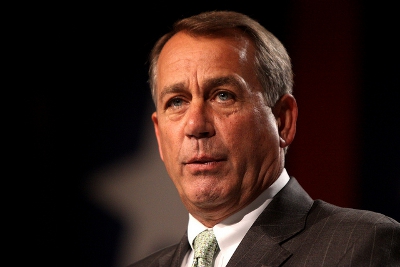USAPP Managing Editor, Chris Gilson looks at the best in political blogging from around the Beltway. Our round-up of state blogs will follow on Saturday afternoon.
President Obama, the Democratic Party, and the GOP
On Monday this week, Roll Call’s POTUS Operandi reports that President Obama has tied his budget veto threat to national security, stating that key elements such as education and research were key to the country’s national defense. Wonkblog meanwhile writes that the President has this far has been less likely than his predecessors to grant pardons and commutations for federal inmates convicted of non-violent crimes, but that this may be about to change. Tuesday sees Political Animal speculate on what President Obama’s succession plan might be. They say that Obama has been setting the stage ‘extremely well’ for his successor, with many executive actions that have put the Republican Party on the back foot, and forced them to be reactive.
Moving on to the Democratic Party more generally, The Atlantic looks at Lorena Gonzalez, a California Democrat who they comment is shifting the party’s focus towards the practical concerns of working Americans. They say that the state assemblywoman wrote a law which guaranteed paid sick leave to all private-sector workers, something that has more recently been called for by President Obama.
The Fix says this week that recent polls have showed that more Americans are leaning towards the Democratic Party compared to the GOP. Should Republicans be worried? Probably not, given that studies have shown that there is little link between prior-year party identification and presidential results.

One thing that has started to concern the Republican Party is sanctuary cities. Last week, an undocumented immigrant allegedly shot and killed a woman in San Francisco; National Journal writes that many in the GOP have been grappling with how to end the many ‘sanctuary cities’ that exist in the U.S., some such as Senator Tom Cotton (R-AK) advocate cutting funding to local governments which do not cooperate with federal immigration agents, while others, such as Senate Majority Whip, John Cornyn (R-TX) argue that cutting funding is too blunt an instrument. Staying on the GOP’s difficult relationship with immigration The Atlantic looks at how the reaction to comments crudely attacking Mexican immigrants made by presidential candidate, Donald Trump, shows how much American political views have changed, while Political Animal says that the GOP keeps avoiding the question of what they want to do with the 11 million undocumented immigrants currently in the country.
Elections and the road to 2016
Despite the fact that the 2016 presidential election is more than 16 months away, there is no shortage of coverage and commentary. RedState writes Monday that despite the assertions of the left voters are not disenfranchised; poor turnout figures merely show that they are too apathetic to vote. National Journal this week examines what the electorate might look like next November – demographic data shows that whites are a shrinking part of the electorate, which should help the Democrats, though this still doesn’t mean that they have an electoral lock on the White House.
Outside the Beltway looks at whether the caucus in Iowa and New Hampshire primary are less important than they once were. They say that in reality, the early results that those states provide are still important because they have the function of winnowing out candidates who perform disappointingly.
Despite the seemingly long wait until the next election, many members of Congress are already in campaign mode, raising money and trying to become more visible on important (and not so important) issues. Smart Politics looks at an unusual (for 2015) group of House Representatives – the 13 who do not have campaign websites. Perhaps their lack of an online presence is tied to the fact that, on average, they won their seats in 2014 with a margin of over 61 points?
Turning to the Republican Party’s 2016 campaigns, Roll Call’s At the Races writes that the party’s attempts to recruit more women candidates for the upcoming election are experiencing some ‘growing pains’. They say that given that there are so far only four competitive House seats in the current cycle, much of the focus has been on retaining current female members. In a similar vein, National Journal says this week there is only one credible GOP woman running for one of the 15 governorships on the ballot in 2015 or 2016 – Catherine Hanaway in Missouri. Focusing on the presidential race, the Monkey Cage takes a look Wednesday at the ‘unsettled, uncertain’ GOP presidential primary, with a graph which shows that about 90 percent of key Republican leaders are so far yet to endorse a candidate.
Looking at some of the candidates in the GOP’s presidential field (and especially one which has been causing the party a headache over immigration):
-

Donald Trump Credit: Gage Skidmore (Flickr, CC-BY-SA-2.0) In his presidential campaign announcement back in June, billionaire, Donald Trump, made offensive comments about Mexican immigrants, comments many others in the GOP’s presidential field have condemned (Outside the Beltway).
- Texas Senator Ted Cruz, however, has defended Trump’s comments, saying that he ‘speaks the truth’ (The Fix)…
- …but Trump may be actually destroying the Republican Party by pushing his party’s ‘backward’ views on immigration back to the front and center of the GOP primary (PoliticusUSA)
- Daily Kos says that Trump has denied reports that the chair of the Republican National Committee, Reince Priebus told him to back off from his comments on immigrants…
- … while The Atlantic looks at the difficulties that the Republican Party is having in tying Trump down.
- As all this has been going on, Former Florida Governor Jeb Bush and his allies have managed to raise $114 million this year (Post Politics)…
- … while the man himself said that we should all be working longer hours if we want the economy to grow (Crooks and Liars).
- Meanwhile, New Jersey Governor, Chris Christie has had some harsh words for Senator Rand Paul (R-KY) over his work to force the expiration of the PATRIOT Act (Americablog)
Moving on to the Democratic side of the 2016 presidential race:
- Sabato’s Crystal Ball says that despite all the hype over Senator Bernie Sanders (who has been climbing in the polls and attracting large crowds at rallies), Hillary Clinton is still very likely to be the Democratic nominee given how behind her the party leadership is.
-

Senator Bernie Sanders Credit: Senate Democrats (Flickr, CC-BY-2.0) Former Secretary of State Clinton had a rocky beginning to her week, when it emerged that she had set up a rope line to keep reporters and photographers at bay when she was at a campaign stop in New Hampshire on the Fourth of July (Post Politics).
- The Fix meanwhile writes that while Clinton relied heavily on white voters in 2008, but that in 2016 she is actually doing better among non-whites…
- … while Townhall reckons that one thing that Clinton does not rely on, is telling the truth.
- Going back to Bernie – is the momentum that’s behind him actually Hillary Clinton’s fault? (Daily Kos).
- … though The Fix reminds us that Sanders is no Howard Dean – he has a less solid base of support in a very different field of candidates.
- Is Vice President Joe Biden going to run for president? Probably. (Americablog).
Government, the Beltway and Congress’ agenda
On Saturday, The Atlantic examines the lasting legacy of Supreme Court Justice Antonin Scalia, who gave dissenting opinions in several of the Supreme Court’s major recent decisions. They say that many legal scholars have differing interpretations of Scalia’s degree of influence on the Court.
The Federal Reserve Bank (or ‘Fed’) determines U.S. monetary policy, and as such has a huge influence on the economy both at home and abroad. Or does it? The Daily Signal writes that the Fed has not reduced the frequency of recessions since it was established in 1913, and offers some policy reforms to make it more effective.
On Thursday, Federal Eye reports that two recent breaches of U.S. government databases resulted in the exposure of sensitive information about more than 22 million federal employees, contractors and their friends and families, a number which vastly exceeds that of earlier estimates.

Moving on to Congress, Smart Politics looks at how House Speaker John Boehner (R-OH) ranks against past Republican Speakers. They say that Boehner is only one of three Republicans to hold a net seat advantage for his party – with the others doing so in the 19th century.
Moving over to the Senate, Political Animal looks at the GOP’s internal debate over the role of the filibuster in the Senate, commenting that those in the party who are looking to the long-term are lining up against reform, with most who favor reform are doing so in order to help to repeal Obamacare. The Hill’s Congress blog meanwhile argues that the bill currently before the Senate to reauthorize the Elementary and Secondary Education Act gives so much flexibility to starts in determining which schools receiving funds are meeting standards that few will be held accountable for their students’ academic performance.
Foreign policy, defense and trade
This week the negotiations between the United Nation’s P5+1 and Iran over that country’s nuclear program were extended. Informed Comment traces the history of Iran’s nuclear program, writing Monday that it dates back to the U.S. ‘Atoms for Peace’ program of the 1950s, which meant the sharing of nuclear technology. Commenting on the extended negotiations, The Hill’s Congress Blog argues that the impending deal does not call for stringent inspections on all of Iran’s sites and is a ‘watered-down’ accord which leaves Iran with its nuclear infrastructure intact. White House Dossier meanwhile has twelve examples of when the Obama administration ‘caved’ to Iran.
On Tuesday, Hit & Run reports that former Attorney General, Eric Holder, has stated that there may be the possibility for National Security Agency leaker, Edward Snowden, to strike a plea bargain with the Department of Justice that will allow him to return to the U.S. from his exile in Moscow. They warn us not to hold our breath, however, given the Obama administration’s tendency to prosecute whistleblowers.
The Daily Signal writes this week that Russia can now add abandoning its obligations under the 1987 Intermediate-Range Nuclear Forces Treaty to its list of broken promises. They say that Russia’s nuclear antics merit a ‘strong response’ from the U.S., and that the current administration should take steps to rein in Russian aggression.
The Hill’s Congress Blog argues that the current U.S. immigration policy is actually preventing poorer nations from actually developing. They say that America’s porous borders help to postpone the development of societies in countries such as Mexico, where the poor would otherwise stay and act as a vocal force for further change.
Obamacare and health policy
On Friday, Political Animal looks at the Obama administration’s revival of a proposal to reimburse physicians for talking with their Medicare patients about their end of life care – the so-called ‘death panels’ . They say that the use of the sobriquet has been fuelled by the abortion anti-choice movement which has been invested in the idea that the practice would lead to a ‘culture of death’ and moves to legalize euthanasia.
Wonkblog says this week that Obamacare has saved American women more than $1 billion on birth control since the Affordable Care Act began requiring insurance plans to cover contraception.
The economy and society
This week commentary on Puerto Rico’s dire economic situation continued. While many commentators drew parallels between Greece’s problems and those of the U.S. territory, The Conscience of a Liberal reminds us that Puerto Rico is not Greece. Krugman says that the territory’s indicators are unlike those of Greece, and its banks are secured by a national safety net.

Continuing on the theme of the economy, Liberty Street Economics ponders whether or not ‘Silicon Alley’ in New York, with its growing ecosystem of tech firms may well end up being the next Silicon Valley. The economic news in the Big Apple was not all good this week with the New York Stock Exchange having its longest computer-related shutdown (at 3 hours 38 minutes) ever on Wednesday, according to Wonkblog.
On Tuesday, The Atlantic reports on a new study which shows that 95 percent of elected prosecutors across the country are white, with 79 percent being white men. The study also finds that three in five states have no black elected prosecutors at all.
While many have been celebrating the Supreme Court’s marriage equality ruling which came at the end of June, Americablog points out that same-sex marriage is still illegal for many Native Americans – specifically in eleven tribes.
This week has seen intense debate over the role of undocumented immigrants and crime, with much vitriol being caused by Donald Trump’s comments on the subject. The Atlantic writes that what Trump does not understand about immigrants and crime is that given that most are hardworking people trying to support their families, targeting immigrants will not make crime disappear.
And finally…
Wonkblog looks at where July 4th is the most and least fun around the country. Hint – avoid the Northeast if you like fireworks.
PoliticusUSA says that Bernie Sanders has the most real twitter followers, at 93 percent, while 57 percent of Chris Christie’s followers are fake.
Featured image: Jeb Bush Credit: Gage Skidmore (Flickr, CC-BY-NC-2.0)
Please read our comments policy before commenting.
Note: This article gives the views of the author, and not the position of USAPP– American Politics and Policy, nor of the London School of Economics.
Shortened URL for this post: http://bit.ly/1gsjZUx







Sanctuary cities are unacceptable and inexcusable. Sen. Cotton has my total support in withholding all Federal funds from them.
Tolerance of illegal immigration has led to an outcome conceptually analogous to that described by Pope as ensuing from failure to reject vice: “Vice is a monster of so frightful mien as to be feared needs only to be seen, but seen too oft, familiar with her face, we first endure, then pity, then finally embrace.” Having thus embraced illegal immigration, all efforts to shake that embrace are complicated by the force of Dirksen’s Inequality: “The mind is no match with the heart for persuasion; constitutionality is no match with compassion
On columnist (Mr. Cohen, Washington Post) has characterized the positive reaction of substantial numbers of citizens of all persuasions to remarks by Mr. Trump, in part, as follows: This stunning turnabout — this depressing and somewhat scary endorsement of frustration, fear and old-fashioned hate — is sure to be noticed by the other GOP candidates.
What Mr. Trump has contributed, however disconcerting it may be to those of us who prefer polished delivery, can hardly be thought of as an endorsement of hate but rather a long overdue, quite public reminder that illegal immigration—with 11 million plus (est.) at-large perpetrators–is the most prevalent type of illegal behavior in the nation. The reminder has resonated with many citizens who have long wondered why so many individuals guilty of blatantly illegal behavior have been permitted (by failure to enforce the law) to escape (dare we say it) detection, detention and deportation; or encouraged to engage in self-repatriation when faced in due course with sure and certain job-deprivation due to national extension and mandated use, by all employers, of E-Verification, combined with strictly enforced “no sanctuary cities, period” legislation, that also includes mandated participation of local officials in enforcement of all federal laws and regulations pertaining to illegal immigration—tolerance of which by public officials across party lines has been a continuing source of frustration to thoughtful citizens.
Very true! Unfortunately, we average income people are not heard on immigration and these bleeding heart Democrats; and, greedy GOP candidates are getting their way. We have no vote on immigrant policy changes or population. Part of it is because of Citizen’s United and special interest who wish to use the immigrants for less pay and no insurance or comp. Not to mention: the upper class and wealthy people do not have to be worried about the immigration crime like the poor or middleclass–they are untouched and we people have to pay for their insurance, food and housing–not just.
Brenda